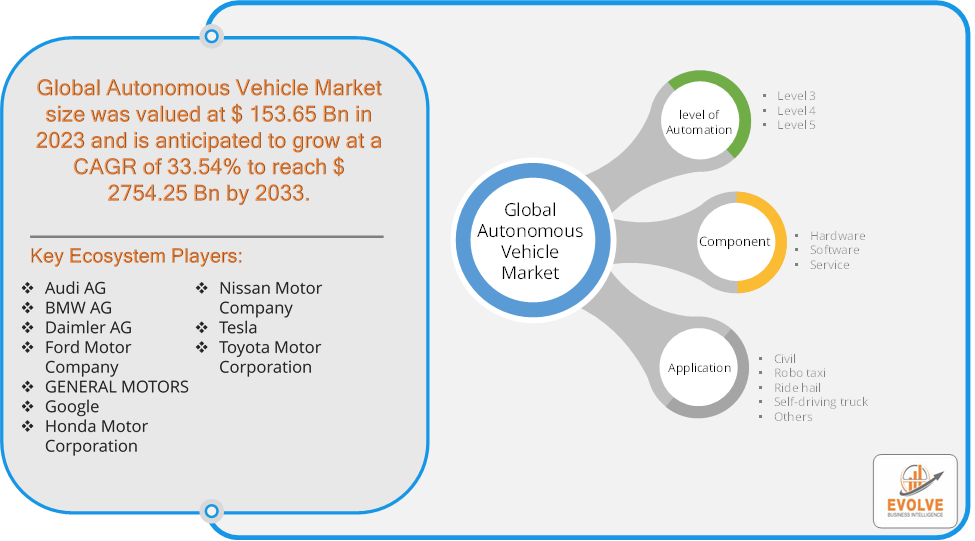Autonomous Vehicle Market Soars: 33.54% CAGR

Evolve Business Intelligence has published a research report on the Global Autonomous Vehicle Market, 2023–2033. The global Autonomous Vehicle Market is projected to exhibit a CAGR of around 33.54% during the forecast period of 2023 to 2033.
Evolve Business Intelligence has recognized the following companies as the key players in the global Autonomous Vehicle Market: Audi AG, BMW AG, Daimler AG, Ford Motor Company, GENERAL MOTORS, Google, Honda Motor Corporation, Nissan Motor Company, Tesla and Toyota Motor Corporation.
 More Information: https://evolvebi.com/report/autonomous-vehicle-market-analysis/
More Information: https://evolvebi.com/report/autonomous-vehicle-market-analysis/
Market Highlights
The Global Autonomous Vehicle Market is projected to be valued at USD 2754.25 Billion by 2033, recording a CAGR of around 33.54% during the forecast period. The Autonomous Vehicle Market refers to the industry encompassing the development, production, and sale of self-driving or driverless vehicles. These vehicles are equipped with advanced technologies, such as artificial intelligence (AI), machine learning, sensors, and navigation systems, that enable them to operate without human intervention. The market includes various types of autonomous vehicles, ranging from passenger cars and commercial trucks to public transportation and delivery drones.
Factors influencing the Autonomous Vehicle Market include technological advancements, regulatory frameworks, safety concerns, infrastructure development, and consumer acceptance. Leading players in this market often include automotive manufacturers, tech companies, and specialized startups.
The COVID-19 pandemic had significant impacts on the Autonomous Vehicle (AV) Market. The pandemic caused significant disruptions in global supply chains, affecting the availability of key components such as sensors, chips, and other electronic parts essential for AV development. This led to delays in production and increased costs. Lockdowns and social distancing measures resulted in the postponement of many AV testing programs. Companies faced challenges in continuing on-road tests, which are crucial for data collection and validation of autonomous systems. The pandemic accelerated the adoption of digital technologies and innovation in the automotive industry. Companies focused on enhancing their AV technologies, improving remote monitoring, and developing more sophisticated simulation tools to continue progress despite physical testing limitations. Consumer attitudes towards autonomous vehicles experienced a shift, with increased awareness and interest in the potential benefits of AVs in ensuring safety and reducing human interaction during pandemics. However, economic uncertainties led to cautious spending behaviour among consumers, affecting the overall demand for new technologies.
Segmental Analysis
The global Autonomous Vehicle Market has been segmented based on Level of Automation, Component and Application.
Based on Level of Automation, the Autonomous Vehicle Market is segmented into Level 3, Level 4 and Level 5. The Level 3 segment is anticipated to dominate the market.
Based on Component, the Autonomous Vehicle Market is segmented into Hardware and Software and Service. The Software and Service segment is anticipated to dominate the market.
Based on Application, the global Autonomous Vehicle Market has been divided into the Civil, Robo taxi, Ride hail, Self-driving truck and Others. The Civil segment is anticipated to dominate the market.
More Information: https://evolvebi.com/report/autonomous-vehicle-market-analysis/
Regional Analysis
The Autonomous Vehicle Market is divided into five regions: North America, Europe, Asia-Pacific, South America, and the Middle East, & Africa. In North America region, The U.S. is at the forefront of AV technology development, with substantial investments from tech companies (Google’s Waymo, Tesla) and traditional automakers (General Motors’ Cruise). Regulation varies by state, with California and Arizona leading in creating conducive environments for AV testing and deployment. In Europe region, Germany is a major hub for automotive innovation, with companies like BMW, Daimler, and Volkswagen leading AV development. Supportive government policies and significant investment in smart infrastructure. In Asia-Pacific region, China is rapidly advancing in AV technology, with major investments from Baidu (Apollo), Alibaba, and Tencent. High urbanization rates, substantial government backing, and demand for advanced mobility solutions. In Middle East and Africa region, The UAE, especially Dubai, aims to be a leader in AV adoption through initiatives like the Dubai Autonomous Transportation Strategy. Government vision, investment in smart cities, and focus on innovation. In Latin America region, Brazil is gradually adopting AV technology, with a focus on urban mobility solutions. Government policies and private sector investments are crucial for development. Mexico is exploring AV technology, particularly for logistics and public transportation.
